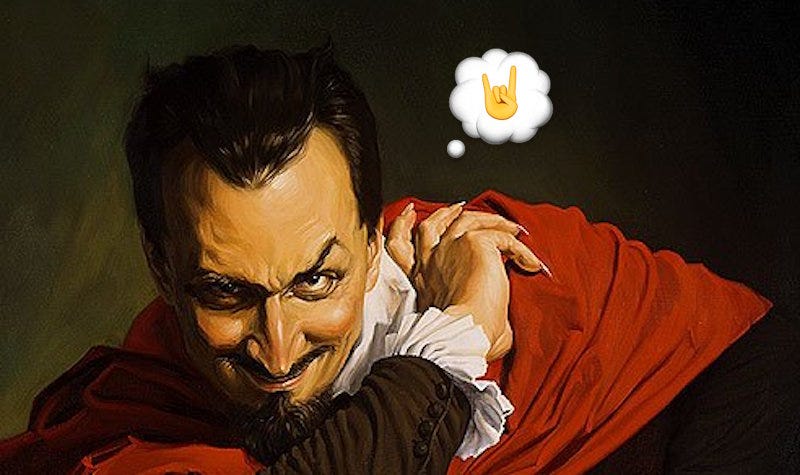The devil's best lines
Or, conversational tips from The Consultant with a Hoof

It’s been said that the devil has all the best lines, and the best tunes, too. So as you lose your face, lose your name, and get fitted for a suit of flame, at least you won’t be bored.
But does he? Or is making us think he’s got the best lines just another trick played by Old Nick? For this Very Special Halloween Issue, I set out to check the record. Let’s start with Milton’s Paradise Lost, as all good Satanists must. Not a barrel of zingers, but the Devil is certainly the star:
The mind is its own place, and in itself
Can make a Heaven of Hell, a Hell of Heaven . . .
Here at least we shall be free . . .
Better to reign in Hell, than serve in Heaven.
Deep. From there we can jump to Goethe’s Faust, a.k.a. The Art of the Deal with The Devil. From Mephistopheles, we learn the finer points of contract negotiation:
I am the spirit of perpetual negation;
And rightly so, for all things that exist
Deserve to perish, and would not be missed
Heavy stuff. Moving onward and eastward, we get to the Russians, the undisputed czars of the Satanic cameo. They’ve always got him down as a dapper, vaguely European gentleman who’s happy to debate nonsense for as long as you like. Also, he’ll let you know how you’re going to die.
In The Brothers Karamazov, Dostoyevsky has the devil show up in a dream, where he runs rings around Ivan with lines like:
From the vehemence with which you deny my existence, I am convinced that you believe in me.
Mikhail Bulgakov’s The Master and Margarita is probably the best 20th century depiction of Lucifer, though purists will note that it does not once mention the salt-rimmed tequila cocktail. (Here’s an excellent fact from The Portable Twentieth-Century Russian Reader: Other titles considered for the book included The Black Magician and The Consultant with a Hoof. If your company hires hoofed consultants, it’s probably time to update your resumé.) When “a transparent man of the strangest appearance” coagulates in Moscow one warm spring day, he happily strikes up a theological conversation:
Of course man is mortal, but that’s only half the problem. The trouble is that mortality sometimes comes to him so suddenly! And he cannot even say what he will be doing this evening!
Nice corporeal form you got there! It’d be a shame if something were to happen to it! Devils make good characters, explained the novelist A.S. Byatt, because they “represent human scepticism that moralists and idealists dare not admit.”
And devils make wicked wits because they are cynics through and through. Wit is about roping disparate ideas together, and the cynic can shortcut this process by pairing any idea with nihilism. It’s not pretty, but it works.
The American writer Ambrose Bierce (1842-1914) did just this in The Devil’s Dictionary, originally titled The Cynic’s Word Book and compiled from a series of short items he wrote for The San Francisco Examiner. The whole thing was put online just as soon as the internet was invented, as you can tell by the design of these pages. Writing in The Paris Review in 2017, Anthony Madrid selected the 74 best entries. I’ll do him one better and offer up the best 6 of those, the curdled cream of the crop:
Air, n. A nutritious substance supplied by a bountiful Providence for the fattening of the poor.
Applause, n. The echo of a platitude.
Conversation, n. A fair for the display of minor mental commodities, each exhibitor being too intent upon the arrangement of his own wares to observe those of this neighbor.
Kilt, n. A costume sometimes worn by Scotchmen in America and Americans in Scotland.
Mayonnaise, n. One of the sauces which serve the French in place of a state religion.
Telephone, n. An invention of the devil which abrogates some of the advantages of making a disagreeable person keep his distance.
To wrap things up, here’s Bulgakov’s Master on how things inevitably wrap up:
And it all ends in tragedy: the man who thought he was in charge is suddenly reduced to lying supine and motionless in a wooden box, and his fellow men, realizing that there is no more sense to be had of him, incinerate him.
Something to consider while chewing on a fun-size Twix. Boo?
Quick quips; lightning
“The theory seems to be that as long as man is a failure he is one of God’s children, but that as soon as he succeeds he is taken over by the Devil.” — H.L. Mencken
Or, deals with devils are the best way to explain your enemy’s success.
“Don’t you know there ain’t no devil, there’s just God when He’s drunk.” — Tom Waits
A distinctly Old Testament viewpoint.
“This is no time for making new enemies.” — Voltaire
Why the Frenchman refused to renounce the devil on his deathbed. Following his lead, I have cleverly not rendered a verdict on whether Lucifer in fact has the best lines.
That’s the 18th issue of Get Wit Quick, your weekly blasphemy from the pastphemy. Styx and stones may break bones, but my book Elements of Wit: Mastering The Art of Being Interesting merely bruises. If a deal with the devil sounds like a bit much, tap the ❤️ below and I’ll give you a silent nod of approval.

